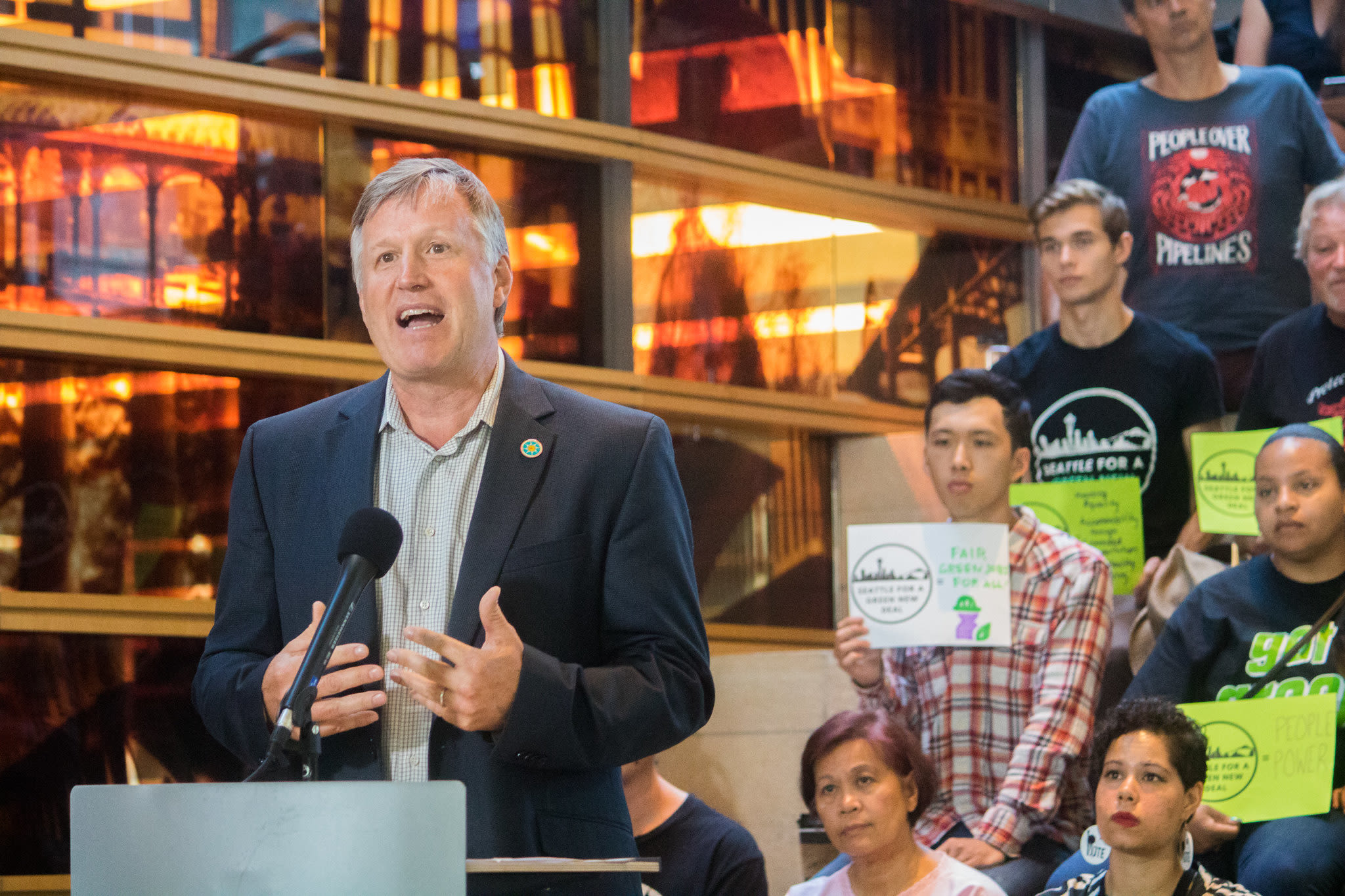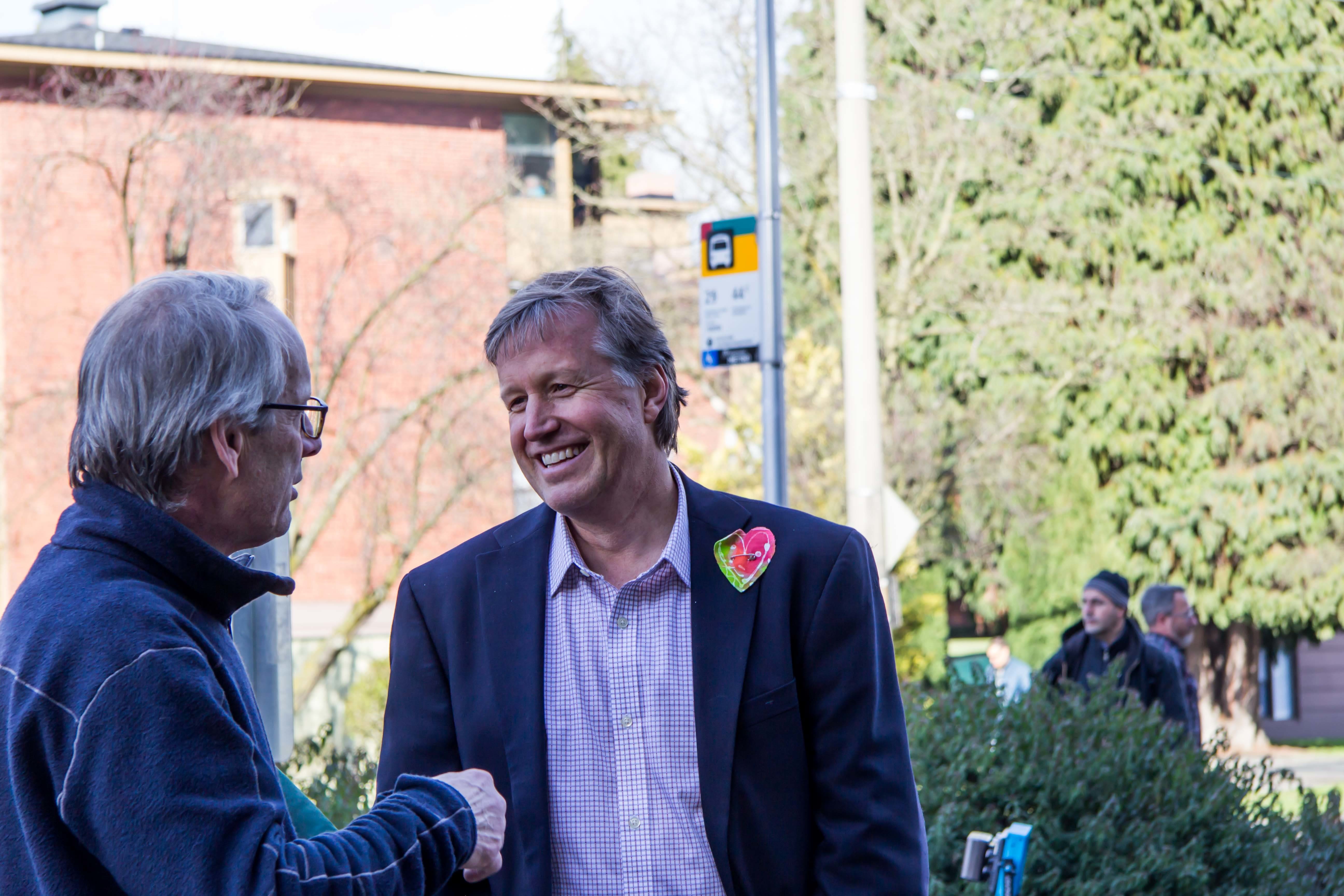News
Highlights from CityClub Tunnel Debate
Here are some more highlights from night's packed double-header debate on the initiative and referendum process (initiative hawker Tim Eyman debated Seattle State Sen. Adam Kline, D-37) and the tunnel referendum, Ref. 1 (city council member Mike O'Brien, a tunnel opponent, debated Downtown Seattle Association President Kate Joncas, a tunnel proponent).
Awkward moment of the night:
When asked to what extent the tunnel vote will be a referendum on Mayor Mike McGinn, O'Brien blanched, then responded slowly: "I'm not going to spend too much time defending the mayor. But when he said, 'I will not stand in the way of the tunnel,' he also said, 'I'll protect the people of Seattle from cost overruns. I don't think this is a referendum on the mayor. When I talk to people in Seattle, they don't say that this is about the mayor. What they want to know is 'what's it going to mean for me?'"
Metaphor of the night:
Kline, responding to Josh's question about how the legislative process is impacted by initiatives: "Picture a bus. The people on the bus have voted among themselves who's going to drive that bus for the next two years. ... Then somebody from the back seat says, 'You're going over the bridge. I vote that we should turn left. And someone else says, 'I believe we should turn right. And the bus stops and we have a vote on it. There is a need for democracy in this country, and we have plenty of it. There's also a need in government for efficiency. ... You can't drive the bus when the crowd in the back is at odds with one another about which direction they want to go, not at the end of those two years or four years, but during that period of time."
Kline's metaphor, if you didn't get it, is a way of explaining a major flaw in the system: The voters elect legislators to govern, but that becomes impossible when initiatives like Eyman I-1053, which requires a two-thirds vote of the legislature, tie their hands, making it impossible for them to do their jobs.
Yeah, Right of the Night:
During his portion of the debate, Eyman went on a spiel about how voters aren't influenced by expensive campaigns because they decide how to vote "based on their value system," not what proponents or opponents say or how well they're funded. Even if one side outspends the other by millions of dollars, voters will simply decide how to vote based on the merits of each side. Money has no influence in politics. Yeah, right.
As Josh pointed out—after Eyman painted a rosy picture of the initiative process simply giving voters an opportunity to "learn" about the issues—"yeah, we just learn about liquor privatization from Costco." Costco has already poured $600,000 into getting its liquor privatization measure on the ballot.
Dodge of the night:
In response to a question about initiative signature fraud, Eyman claimed that there had been only two instances of verified fraud in the past ten years, both involving the SEIU. When Josh pointed out that a pair of signature gatherers for a 2008 Eyman campaign were convicted of fraud in Spokane, Eyman parried, responding, "Again, that was before it was turned in, just like with the SEIU."
Scary number of the night:
During his response to a question about cost overruns, O'Brien mentioned a frightening number: $1 billion, which he said was the amount of shortfall expected in this year's revenue forecast, due in September, compared to last year's. "That means more cuts" to funding for health care, transit, and education, O'Brien said.
I checked O'Brien's number with state senate budget chair Ed Murray, who said, "there's been all sort of wild speculation" on the upcoming revenue shortfall, ranging from a few hundred million on the low end to $1 billion on the high end.
Seeming contradiction of the night:
Although O'Brien did a good job distancing himself from Eyman on tolls --- saying he believed in systemwide tolling to reduce congestion, but that tolling just one road when there are plenty of free alternatives nearby won't work --- we still see a contradiction in his alarmist statements (citing "experts" and "projections) about the 40,000 cars tunnel opponents say will choke downtown streets to avoid the tolled tunnel, and his conviction that people are smart enough to adapt to changes in the road system, such as when a road shuts down.
In response to a question about the Embarcadero Freeway in San Francisco, which shut down with no ill effects on traffic, O'Brien said, "Every time we talk about Carmageddon and disaster and inevitable gridlock," people adapt. "When I-5 shut down for two weeks ... people found other ways to get around. We adapt. That's what we've seen and that's what we know we can do here."
So which is it: Do we all flood on to city streets like lemmings, or do we adapt and "find other ways to get around"? To my mind, O'Brien and tunnel proponents still haven't come up with a satisfactory answer.
Awkward moment of the night:
When asked to what extent the tunnel vote will be a referendum on Mayor Mike McGinn, O'Brien blanched, then responded slowly: "I'm not going to spend too much time defending the mayor. But when he said, 'I will not stand in the way of the tunnel,' he also said, 'I'll protect the people of Seattle from cost overruns. I don't think this is a referendum on the mayor. When I talk to people in Seattle, they don't say that this is about the mayor. What they want to know is 'what's it going to mean for me?'"
Metaphor of the night:
Kline, responding to Josh's question about how the legislative process is impacted by initiatives: "Picture a bus. The people on the bus have voted among themselves who's going to drive that bus for the next two years. ... Then somebody from the back seat says, 'You're going over the bridge. I vote that we should turn left. And someone else says, 'I believe we should turn right. And the bus stops and we have a vote on it. There is a need for democracy in this country, and we have plenty of it. There's also a need in government for efficiency. ... You can't drive the bus when the crowd in the back is at odds with one another about which direction they want to go, not at the end of those two years or four years, but during that period of time."
Kline's metaphor, if you didn't get it, is a way of explaining a major flaw in the system: The voters elect legislators to govern, but that becomes impossible when initiatives like Eyman I-1053, which requires a two-thirds vote of the legislature, tie their hands, making it impossible for them to do their jobs.
Yeah, Right of the Night:
During his portion of the debate, Eyman went on a spiel about how voters aren't influenced by expensive campaigns because they decide how to vote "based on their value system," not what proponents or opponents say or how well they're funded. Even if one side outspends the other by millions of dollars, voters will simply decide how to vote based on the merits of each side. Money has no influence in politics. Yeah, right.
As Josh pointed out—after Eyman painted a rosy picture of the initiative process simply giving voters an opportunity to "learn" about the issues—"yeah, we just learn about liquor privatization from Costco." Costco has already poured $600,000 into getting its liquor privatization measure on the ballot.
Dodge of the night:
In response to a question about initiative signature fraud, Eyman claimed that there had been only two instances of verified fraud in the past ten years, both involving the SEIU. When Josh pointed out that a pair of signature gatherers for a 2008 Eyman campaign were convicted of fraud in Spokane, Eyman parried, responding, "Again, that was before it was turned in, just like with the SEIU."
Scary number of the night:
During his response to a question about cost overruns, O'Brien mentioned a frightening number: $1 billion, which he said was the amount of shortfall expected in this year's revenue forecast, due in September, compared to last year's. "That means more cuts" to funding for health care, transit, and education, O'Brien said.
I checked O'Brien's number with state senate budget chair Ed Murray, who said, "there's been all sort of wild speculation" on the upcoming revenue shortfall, ranging from a few hundred million on the low end to $1 billion on the high end.
Seeming contradiction of the night:
Although O'Brien did a good job distancing himself from Eyman on tolls --- saying he believed in systemwide tolling to reduce congestion, but that tolling just one road when there are plenty of free alternatives nearby won't work --- we still see a contradiction in his alarmist statements (citing "experts" and "projections) about the 40,000 cars tunnel opponents say will choke downtown streets to avoid the tolled tunnel, and his conviction that people are smart enough to adapt to changes in the road system, such as when a road shuts down.
In response to a question about the Embarcadero Freeway in San Francisco, which shut down with no ill effects on traffic, O'Brien said, "Every time we talk about Carmageddon and disaster and inevitable gridlock," people adapt. "When I-5 shut down for two weeks ... people found other ways to get around. We adapt. That's what we've seen and that's what we know we can do here."
So which is it: Do we all flood on to city streets like lemmings, or do we adapt and "find other ways to get around"? To my mind, O'Brien and tunnel proponents still haven't come up with a satisfactory answer.




